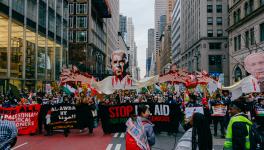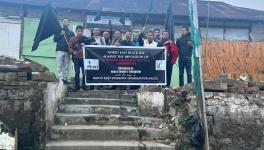Exit Global Wars, Enter Coronavirus

Representational image. | Image Courtesy: Pixabay
The war against Coronavirus, paradoxically, has made friends out of foes while waging war on the now common and powerful enemy. Russia has sent urgent medical supplies to a besieged USA, the country which has imposed crippling economic sanctions on Russia. Ironically, a century ago, Western powers blockaded Russian ports to ensure that urgent medical supplies sent by the American Red Cross did not reach Russians dying in a typhus epidemic.
And now, political and ideological differences are being sunk, hostilities are put in abeyance, to outwit the common monstrous enemy. But for how long?
Violence has fascinated mankind. Wars seemed the elixir of life. Most legends and folklore emanate from tales of courage in battlefields. This courage could also be interpreted as cruelty towards and slaughter of the enemy. The world epics glorify battles; Ramayana, Mahabharata, Iliad, Nordic Sagas, Teutonic Lieds, Icelandic Eddas. The ancient world had little use for domestic virtues or individual nobility. Perhaps life in those misty times was boring; entertainment was provided by tales of grandeur that were often plucked out from actual events.
The Ramayana and Mahabharata are replete with descriptions of fantastic weaponry. I say fantastic from the Greek word phantasm which means imagination because the weapons described could not have existed though they have close affinity to the missiles and nuclear warheads so cherished by the powerful nations of today. Hindu nationalists would say we were the original inventors of these weaponry which fell into disuse after the advent of Lord Buddha’s ahimsa.
Homer’s Iliad narrates the ten year old siege and war between Troy and Greek states. The casus belli was not the abduction of Helen; she was a decoy. What the Greeks wanted was the bronze metal that the Trojans had begun to produce and which was used for making weapons, ships and citadels. When the Greeks could not penetrate the formidable walls of Troy they entered the citadel through the massive wooden horse and then set the city on fire. Remains of that great civilization may be seen in Hisarlik, Turkey.
The first recorded Asia-Europe armed conflict were the Greco-Persian wars during 498-448 BCE. Famous Persian kings—Darius and Cyrus—invaded Greece and were driven back by Greek generals such as Pericles and Lysander. After evicting the Persians, the Greeks fell to squabbling among themselves during the Peloponnesian wars in the third century BCE—recorded by the Thracian historian Thucydides. Alexander of Macedon soon embarked on military campaigns against Persia, India and Central Asia. His imperial progress halted with his death. When the Greek Empire disintegrated Romans dominated Europe.
The desire to dominate maritime trade, thirst for raw materials, especially the much-prized silver and lead of Carthage in North Africa made Romans wage the Punic Wars (209-146 BCE) on this nation. When the Roman Empire decayed, new empires and civilizations rose in West Asia, India and China. Their territorial expansion was achieved by their infantry and cavalry who fought with swords and spears, bows and arrows.
It is a tragic paradox that while exploring the possibility of prolonging human longevity, Chinese alchemists in the ninth century began experimenting with various metals. While mixing materials, the alchemists inadvertently produced gunpowder. They were delighted with the smoke and flames, though some died in the explosions that occurred.
This deadly invention is a sinister example of the law of unintended consequences. It paved the way for production of more weapons - fiery arrows (called flying fire) rifles, cannons, grenades and bombs – and the destruction of human lives. It changed the very nature of humanity.
Though disappointed that this new material did not extend longevity, the Chinese army began using gunpowder to fight the Mongol armies that were invading China. The Mongols were intrepid horsemen but they could not evade the “flying fire”—arrows tipped with gunpowder—that scorched the advancing Mongol cavalry. In time the Mongols learned about gunpowder and Kublai Khan’s army conquered China and ruled it for three centuries.
The Silk Road had fallen into disuse during the Mongol invasions. As the Mongols became a settled people and established their empire from China to Iran, the Silk Road once more became the centre of trade and cultural exchange. European merchants, explorers and scholars traversed this road, mingling with Persians, Indians, Central Asians and Arabs, learning their skills and imbibing their ideas. It was not long before the manufacture and use of gunpowder passed on to Europeans, Arabs and Turks.
Until the 15th century, walled cities and fortifications protected its inhabitants. Then in 1453 the Ottoman Turks demolished by cannon fire the formidable walls of Constantinople which had withstood attacks for a millennium. This once again changed military strategy and structure of armies. In the ensuing centuries more innovations were made for attacks, invasions and destruction of cities and inhabitants.
The superior weaponry of European colonial powers conferred a huge advantage over the countries they invaded. In the 16th and 17th centuries well-equipped Spanish and Portuguese armies subjugated the vast continent of South America. The native Aztecs, Inca and Mayan people, who had thousand-year-old civilizations, watched their lands grabbed by the invaders, their temples razed, their gold and gems stolen by conquistadors, who said they had won souls for Christ. The American pioneers in the Wild West employed the same strategy by decimating the Cherokee, Apache and Sioux people. The inequality in arms was demonstrated in the mid-20th century when a modern Italian army invaded Ethiopia with tanks and mustard gas while Ethiopians fought with spears.
With the rise of militarism a massive arms race began in Europe in the closing years of the 19th century, culminating in the First World War. When the war ended the victors—mainly Britain and France—inflicted the harshest reparations on Germany through the Treaty of Versailles in 1919. Germany’s deep resentment was one of the causes for the rise of Nazism and the arms race that followed. The Second World War displayed the massive arsenal assembled by the combatants culminating in the horrific use of the atom bomb on two Japanese cities. Once more this weapon changed the nature of warfare.
Though there was now a nuclear deterrent the two super-powers refrained from direct confrontation. Now proxy wars were fought on the soil of other nations. These were the Korean War (1950 -1953) the Vietnam War (1962-1975) civil wars in Afghanistan, the Balkans, Lebanon. The dismantling of the Soviet Union resulted in a unipolar war; USA decided in which nation’s affairs it would interfere in the name of democracy. Thus, in violation of international law, the USA invaded Afghanistan in 2001, Iraq in 2003, Libya in 2011, Syria in 2013. The causes for these invasions varied in mendacity; to remove weapons of mass destructions, safeguard human rights.
The results were interminable violence and bombings, huge refugee camps, deaths of hundreds of thousands. There were other battles and wars of liberation as subjugated colonies of the West sought to evict alien oppressors.
In the 1960s, devastated Europeans used to say that Americans who waged wars in distant lands never understood the agony of wars. The vast Atlantic and Pacific Oceans protected them. During the Cold War, USA extended its protective umbrella to NATO countries, and then their Asian partners through the CENTO and SEATO pacts—to protect them from Russia. This preponderance of power led to “American exceptionalism.” A century earlier, Britain had declared that Britannia would forever rule the waves and would never, never be slaves. Two millennia earlier the Roman statesman Tibullus extolled the eternal walls of Rome—which were shortly torn down by Attila the Hun when he sacked Rome.
To the Western world, conflicts of the late 20th and early 21st centuries were distant dangers confined to the non-Western world. The real or imagined enemies were visible and entirely manageable through modern weaponry. Efficient use of modern arms killed 50 million people during Second World War, some 400,000 in West Asia and Afghanistan, and forced millions to flee their strife torn lands to safer lands or drown in seas. Both sides called these conflicts righteous wars.
Then out of a Chinese town came a virus, ignored at first, called a hoax later, until it spread its malignant wings across continents and into beautiful well ordered cities in Europe, Japan, Korea, Iran, Korea, Indonesia, India, Russia, and finally USA. From a limited epidemic in Wuhan it has become a global pandemic, swiftly crossing frontiers by unwitting collaborators and infecting nearly a million people.
Never has the world encountered such a common and deadly enemy. Nations had formed groups and alliances to fight adversaries. They had waged devastating wars for military and naval bases, for oil and raw material. In modern times the arms lobby and militarists have encouraged, even provoked wars and organised invasions. There was a purpose for wars.
The war waged by Coronavirus has one blind purpose; indiscriminate death with regard neither for the high nor the humble, contemptuous of frontiers and ideologies. This war has two combatants—Coronavirus and Humanity. Coronavirus is omnipotent. Humanity has no army and no arsenal to fight the terrifying invisible enemy. The formidable missiles, the stockpile of nuclear warheads, massive artillery, the aircraft that drop bombs on unarmed civilians, demolish cities and kill innocent people—these are of no avail against this intangible adversary. Homo Sapiens, who boasted conquering space and landing on the moon are unable to defeat the virus.
The once powerful, now defenceless human combatants, have unarmed assistants; courageous doctors, nurses, paramedics who are endangering their lives for fellow humans, vegetable vendors cowering in street corners, grocery shop and medical shop owners selling their wares through half-shuttered doors, those sweeping our roads. Denizens of another galaxy might wonder why Earth, once full of movement, merriment and music, seems like a massive, silent ghost town.
Perhaps in the face of this Apocalypse foes will unite—and bid farewell to arms—for a while.
The author is a retired civil servant and writes on international history. The views are personal.
Get the latest reports & analysis with people's perspective on Protests, movements & deep analytical videos, discussions of the current affairs in your Telegram app. Subscribe to NewsClick's Telegram channel & get Real-Time updates on stories, as they get published on our website.
























